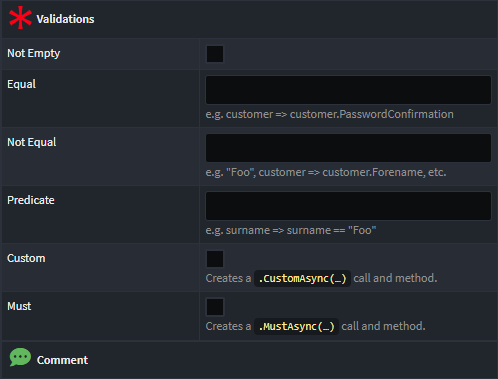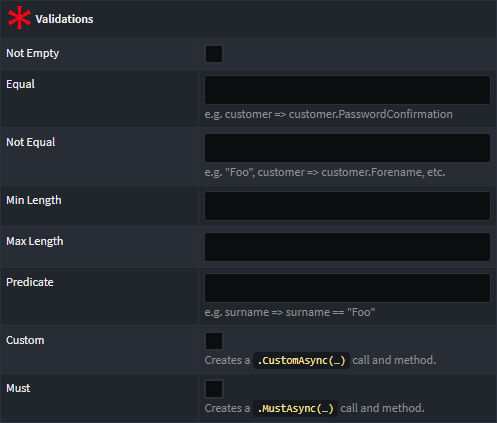Intent.Application.FluentValidation
This module provides a designer stereotype and common logic used by various other modules to generate FluentValidation files for different implementations of data contracts.
While this module does not contain templates on its own, it includes common logic utilized by other modules. For example, the Intent.Modules.Application.MediatR module uses functions from this module to generate validators for Commands and Querys. Similarly, the Intent.Modules.Application.FluentValidation.Dtos module relies on this logic for generating validators for DTOs.
Configuring Validation Rules for Fields on Contracts
When this module is installed, a Validations stereotype is automatically applied to all DTO-Field items in the Services Designer. Depending on the selected Type for the field, different options will be displayed. For example, here are the options for a guid field:

And here are the options for a string field:

Custom Validation Rules
While the default available rules can handle most validation scenarios, you can select the Custom or Must option to create custom validation rules. This will generate a method in the validator (which is ignored by Intent Architect) to allow custom validation logic.
Custom Validator
When the Custom property checkbox is selected, a CustomAsync(…) rule is generated, along with a field-specific method stub to which it delegates. Unlike the Predicate Validator, Custom rules allow you to specify custom validation failure messages. For more information, refer to the FluentValidation Docs on Custom Validators.
Predicate Validator
When the Must property checkbox is selected, a MustAsync(…) rule is generated, along with a field-specific method stub. Compared to a Custom Validator, Must rules work with simple predicates and do not allow for specifying custom validation failure messages. For more details, see the FluentValidation Docs on Predicate Validators.
For details on all available validation rules and how they work, refer to the FluentValidation Docs.
Message Place Holders
The FluentValidation library supports message placeholders, which allow you to insert dynamic values into validation messages. These can be used in custom validators within code, or in predicate validators via the Must Message field.
For example: {PropertyName} with a value of '{PropertyValue}' already exists
When validation runs, FluentValidation automatically replaces the placeholders with the actual property name and property value, producing a clear and contextualized error message.
Implicit/Inferred Validation Rules
In certain cases, this module automatically generates specific validation rules for fields when they are not explicitly specified in the Validation stereotype. These cases include:
Max Length
A Max Length validation rule is generated when a field is mapped to an attribute that has the Text Constraints stereotype applied, with the MaxLength property set.
Not Null
A Not Null validation rule is generated for fields with nullable types when the Is Nullable checkbox is unchecked.